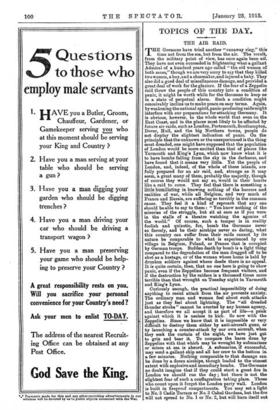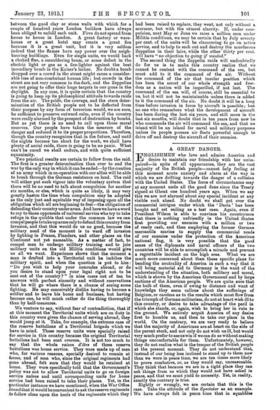TOPICS OF THE DAY.
THE AIR RAID.
THE Germans have tried another "runaway ring," this time not from the sea, but from the air. The result, from the military point of view, has once again been nil. They have not even succeeded in frightening what a gallant Admiral of a hundred years ago called " the old women of both sexes," though we are very sorry to say that they killed two women, a boy, and a shoemaker,and injured a baby. They also did a good deal of miscellaneous damage, and provided a great deal of work for the glaziers. If the fear of a Zeppelin raid threw the people of this country into a condition of panic, it might be worth -while for the Germans to keep us in a state of perpetual alarm. Such a condition might conceivably incline us to make peace on easy terms. Again, by weakening the national spirit, panic-producing raids might interfere with our preparations for attacking Germany. It is obvious, however, to the whole world that even on the East Coast, and in the places most likely to be affected by future air raids, such as London, Portsmouth, Southampton, Dover, Hull, and the big Northern towns, people do not display the slightest indication of panic. On the principle that the unknown or the unexperienced is the thing most dreaded, one might have supposed that the population of London would be more excited than that of places like Yarmouth and King's Lynn, which now know what it is to have bombs falling from the sky in the darkness, and have found that it means very little. Yet the people of London, and, indeed, of the whole of these islands, are fully prepared for an air raid, and, strange as it may seem, a great many of them, probably the majority, though of course they would not say so, would in their hearts like a raid to come. They feel that there is something a little humiliating in knowing nothing of the horrors and realities of war, while all Belgium, and very much of France and Russia, are suffering so terribly in the common cause. They feel it a kind of reproach that any one should be able to say to them : " You know nothing of the miseries of the struggle, but sit at ease as if you were in the stalls of a theatre watching the agonies of the world." Of course, such a temper is in reality foolish and quixotic, for, bomb the Germans never so fiercely, and be their airships never so daring, what this country can suffer from their raids cannot by its nature be comparable to what is experienced by one village in Belgium, Poland, or France that is occupied by German troops. Sudden death by bomb is a light thing compared to the degradation of the man dragged off to be shot as a hostage, or of the woman whose home is held by drunken soldiers against whose deeds there is no appeal. It is quite certain, then, that no one hero is going to show panic, even if the Zeppelins become frequent visitors, and if the destruction by the raiders is a thousand times more terrible than that wrought on Tuesday night in Yarmouth and King's Lynn. Curiously enough, the practical impossibility of doing anything to resist attack from the air prevents anxiety. The ordinary man and woman feel about such attacks just as they feel about lightning. The "all dreaded thunder stroke" cannot be averted by any human agency, and therefore we all accept it as part of life—a prick against which it is useless to kick. So now with the Zeppelins. Since we know that it is impossible or very difficult to destroy them either by anti-aircraft guns, or by launching a counter-attack by our own aircraft, when they seek the curtain of the night, we have just got to grin and bear it. To compare the harm done by Zeppelins with that which may be wrought by submarines or mines at sea is absurd. A submarine, if successful, may send a gallant ship and all her crew to the bottom in a few minutes. Nothing comparable to that damage can be done by a dozen airships, though loaded to the utmost extent with explosive and incendiary bombs. The Germane no doubt imagine that if they could start a great fire in London we should rue the day ; but there is not the slightest fear of such a conflagration taking place. Those who count upon it forget the London party wall. London is built in fireproof compartments. You may set a light to No. 3 Cadiz Terrace or No. 3 Cabul Gardens, but the fire will not spread to No. 1 or No. 2, but will burn itself out between the good clay or stone walls with which for a couple of hundred years London builders have always been obliged to enfold each unit. Fires do not spread from house to house in London. A great factory or ware- house or a great hotel may create a great fire because it is a great unit, but it is very seldom indeed that the flames have any power over the neigh- bouring buildings. Even for single unite, we would back a choked flue, a smouldering beam, or some defect in the electric light or gas as a fire-lighter against the beet incendiary bomb in the Kaiser's locker. No doubt a bomb dropped over a crowd in the street might cause a consider- able loss of non-combatant human life ; but crowds in the street are not very common in the dark, and the Zeppelins are not going to offer their huge targets to our guns in the daylight. In any case, it is quite certain that the country is going to keep up its philosophical attitude towards raids from the air. The pride, the courage, and the stern deter- mination of the British people not to be deflected from their purpose by any form of terrorism would, we are sure, be sufficient to preserve outward calm, even if the country were really alarmed by the prospect of destruction by bombs. But as yet there is no need to call upon those moral reserves. Our people have taken the measure of the danger and reduced it to its proper proportions. Therefore, though the country recognizes that in the future, and until the nights become too short for the work, we shall have plenty of aerial raids, there is going to be no panic. What can't be cured we shall endure, and with quite sufficient equanimity. Two practical results are certain to follow from the raid. The first is a greater determination than ever to end the war by the only way in which it can be ended—by the creation of an army which in co-operation with our allies will he able to break through the German resistance on land. The raid will either put such vigour into the voluntary system that there will be no need to talk about compulsion for another six months, or else, which is quite as likely, it may very greatly hasten the time when compulsion may be adopted as the only just and equitable way of imposing upon all the obligation which all are beginning to feel—the obligation of defending their country under arms. And here we have a word to say to those opponents of universal service who try to take refuge in the quibble that under the common law we can compel people totake up arms only to defend this country from invasion, and that this would do us no good, because the military need of the moment is to ward off invasion by fighting in France, Flanders, and other places on the Continent not yet nameable. As a matter of fact, to compel men to undergo military training and to join military units on the old Militia conditions would give us all we want. Experience shows that the moment a man is drafted into a Territorial unit he imbibes the military spirit, and when the question is put to him : "Do you wish to help your comrades abroad, or do you desire to stand upon your legal right not to be sent out of the country ? " in nine cases out of ten be answers with perfect sincerity and without reservations that he will go where there is a chance of seeing some fighting. He may conceivably dislike having to become a soldier and to leave his home and business, but having become one, he will much rather do the thing thoroughly than by half-measures.
We venture to say, without fear of contradiction, that if at this moment the Territorial unite which are on duty in this country were given the chance of serving abroad, they would jump at it. Take, for example, the extreme case of the reserve battalions of a Territorial brigade which we have in mind. These reserve unite were specially raised -for service in this country because the original Territorial battalions had been sent oversee. It is not too much to say that the whole raison &etre of these reserve battalions was home service. They were made up of men who, for various reasons, specially desired to remain at home, and of men who, since the original regiments had -gone abroad, felt sure that they would be retained at home. They were specifically told that the Government's policy was not to allow Territorial unite to go on foreign service unless and until corresponding units for home service had been raised to take their places. Yet, in the 'particular instance we have mentioned, when the War Office .found that it would be convenient to ask the reserve regiments to follow close upon the heels of the regiments which they
had been raised to replace, they went, not only without a murmur, but with the utmost alacrity. If, under com- pulsion, next May or June we raise a million men under Militia conditions, we may be certain that by July seventy per cent. of the units will be clamouring to go on active service, and to help to seek out and destroy the murderous Zeppelins in their lairs, while the other thirty per cent. will have "no objection to going if wanted."
The second thing the Zeppelin raids will undoubtedly do for us is to make this country realize that we cannot be content with the command of the sea, but must add to it the command of the air. Without the command of the air that insular position which has been the secret of our whole strength and free- dom as a nation will be imperilled, if not lost. The command of the sea will, of course, still be essential to us, but it will not be maintainable unless there is added to it the command of the air. No doubt it will be a long time before invasion in force by aircraft is possible; but no one who remembers what the development of aircraft has been during the last six years, and still more in the last six menthe, will doubt that in ten years from now he who commands the air will command the sea, and that no island will be an island for naval and military purposes unless its people possess air fleets powerful enough to drive off and destroy the aircraft of their enemies.



































 Previous page
Previous page